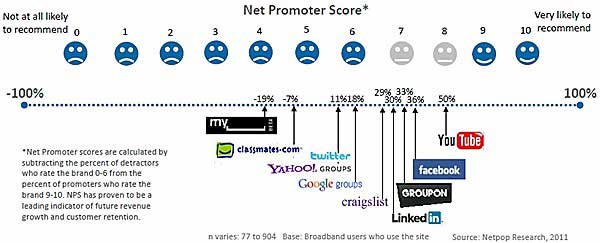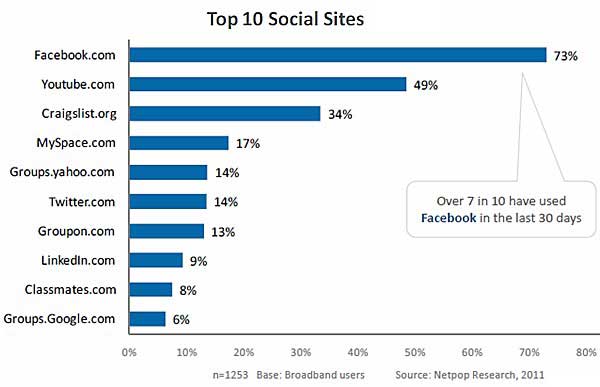Although Facebook is the most widely used social networking site in the US, users of YouTube are more likely to recommend that site than users of other popular social media websites—including Facebook and Twitter—are likely to recommend those sites, according to a study by Netpop Research.
Using the Net Promoter Score* (NPS) method to measure user satisfaction, YouTube is the social website most likely to be recommended by its users (50%), followed by Facebook (36%) and group-buying site Groupon (33%).

Meanwhile, Twitter users are less likely (11%) to recommend that site than are users of LinkedIn (30%) or Craigslist (29%).
Below, other findings from the Netpop Research study, Social Animals: Who's Sharing What and Why Online.
Facebook is still the most popular social site: 73% of surveyed US broadband users say they have used the site in the previous 30 days, while nearly one-half (49%) have used YouTube.

Roughly one-third (34%) of broadband users say they've used Craigslist in the previous 30 days, while 14% have used Twitter.
Looking for real, hard data that can help you match social media tools and tactics to your marketing goals? The State of Social Media Marketing, a 240-page original research report from MarketingProfs, gives you the inside scoop on how 5,140 marketing pros are using social media to create winning campaigns, measure ROI, and reach audiences in new and exciting ways.
Contributing Content Online
Overall, 73% of broadband users contribute content online via various social media activities, but levels vary by age and gender:
- Gen-Y adults are the most active social media users: 82% of adults age 18-34 contribute content.
- Women are the second-most active: 78% contribute content, compared with 66% of men.
Broadband users contribute various types of content to social sites, most often sending or forwarding emails (46%) and posting to social networking sites (39%). Some 10% of broadband users post content to microblogs, up 400% over 2009 levels.
* Net Promoter Scores (NPS) take the percentage of customers who are Promoters and subtract the percentage who are Detractors. Promoters (score 9-10) are loyal enthusiasts who buy and refer others, fueling growth, while Detractors (score 0-6) are unhappy customers who can damage a brand and impede growth via negative word-of-mouth. Passives (score 7-8) are satisfied but unenthusiastic customers who are vulnerable to competitive offerings.
About the data: Findings are from the Netpop Research survey conducted among 1,253 US broadband users age 13+, Jan 1-13, 2011.



